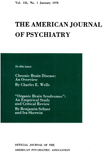The family in exile: Cuban expatriates in the United States
Abstract
For the nearly one million Cuban exiles in this country, the ordeal of expatriation has meant anguish and uprootedness, challenge and accomplishment. Several factors account for the comparatively successful aspects of their struggle: relatively high occupational and educational levels, formation of vigorous communities that permit the maintenance of a positive ethnic consciousness and the creation of strong social ties, and effectively organized reception by the United States. Expatriation is always traumatic and produces "casualties," but mastery of the struggles it involves can lead to personal growth and expanded horizons. The Cuban expatriate experience shows that the influx of large numbers of refugees can be a creative and enriching process for both the host country and the individual refugee.
Access content
To read the fulltext, please use one of the options below to sign in or purchase access.- Personal login
- Institutional Login
- Sign in via OpenAthens
- Register for access
-
Please login/register if you wish to pair your device and check access availability.
Not a subscriber?
PsychiatryOnline subscription options offer access to the DSM-5 library, books, journals, CME, and patient resources. This all-in-one virtual library provides psychiatrists and mental health professionals with key resources for diagnosis, treatment, research, and professional development.
Need more help? PsychiatryOnline Customer Service may be reached by emailing [email protected] or by calling 800-368-5777 (in the U.S.) or 703-907-7322 (outside the U.S.).



